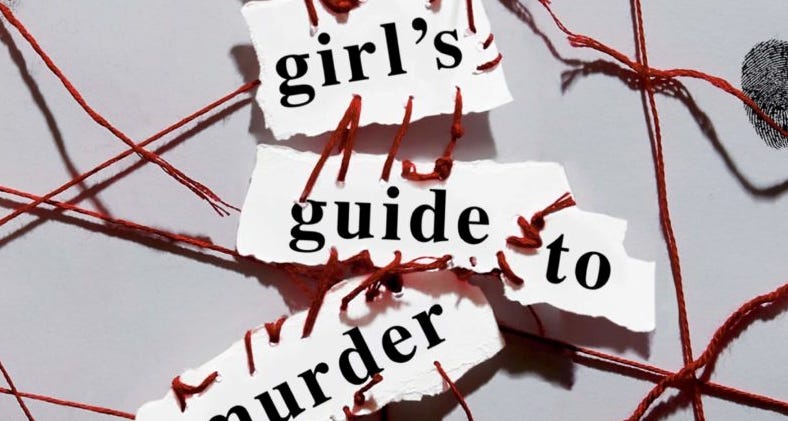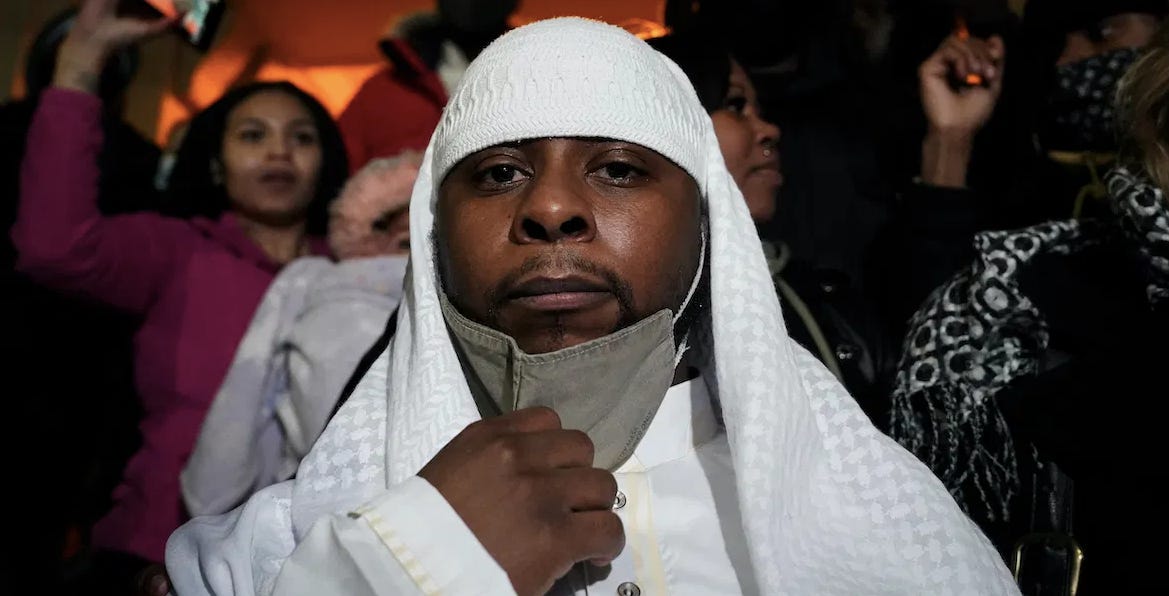More "Meta" True-Crime Fiction · John Walsh · Teresa Giudice
Plus, dumpster tapes and a garbage grand jury
Elizabeth Held is back with a second installment on “meta” true-crime properties: books, pods, and other media that put true crime at the center of their fictional narratives. Today she’s taking us through a couple of YA series…
*******
Maureen Johnson, a veteran YA novelist, dedicated the second book of the Truly Devious series to “all the murderinos,” a reference to fans of the popular My Favorite Murder podcast.
Johnson is one of many authors incorporating her love of true crime into fictional books, but she and author Holly Jackson are writing for and about teens.
Fans of true crime and teen dramas — such as The CW’s Nancy Drew or Riverdale — will find a lot to love about these books.
Truly Devious by Maureen Johnson
The Truly Devious series follows teenage true-crime enthusiast Stevie Bell as she begins her studies at Ellingham Academy, a famous elite private school in rural Vermont. All the students at Ellingham have a special talent. Stevie’s classmates are best-selling novelists, YouTube stars, and world-class inventors.
Stevie’s exceptional talent? Her obsession with an infamous cold case that took place on Ellingham’s campus. Shortly after the school’s opening, the wife and daughter of its eccentric president were kidnapped, a plot that was partially inspired by the Lindbergh and Brooke Hart kidnappings. The only clue to the culprit is a creepy letter signed by “Truly Devious.” Seventy-five years later, Stevie sets out to solve the case, and throughout three books, she does just that.
Johnson focuses a significant part of the second book on Stevie’s internship with a local professor writing a book about the kidnapping. Through that plotline — and the mystery’s twists and turns — she considers how true-crime narratives are crafted, what evidence is considered and what evidence is not.
YA readers will find a lot to like about the Truly Devious series, which includes nods to The Westing Game, Sherlock Holmes, and Agatha Christie’s work. The books nail the big teenage emotions we’ve all lived through while delivering a tightly plotted mystery. The series, at times, veers off into slightly fantastical elements, but that’s part of its fun. I devoured all three books in three days over the summer and have already pre-ordered the fourth installment due out this summer.
A Good Girl’s Guide to Murder by Holly Jackson
The first book in this series, also titled A Good Girl’s Guide to Murder, is inspired by the first season of Serial. In it, high school senior Pip Fitz-Amobi sets out to re-examine the murder of a former student, Andie Bell. Police determined that Sal Singh, Andie’s boyfriend, was the murderer after he was found dead of an apparent suicide. Five years after the tragic deaths, Pip is convinced the police had the wrong person. As her senior project, she conducts her own investigation.
Jackson’s love of the genre shines through the book, which reads like a true-crime podcast transcript. The series’ second book, Good Girl, Bad Blood, features Pip making a podcast of the investigation depicted in A Good Girl’s Guide. Both books have the casual, come-along-for-the-ride feel of some of my favorite investigative podcasts. The audiobooks — full-cast productions — are a particular treat.
The author pays particular attention to the emotional cost of conducting an investigation and producing a true-crime property. She highlights the damage Pip and the victims’ families and friends suffer as old wounds are reopened, raising questions about ethics many true-crime fans struggle with.
With both A Good Girl’s Guide and Good Girl, Bad Blood, I intended to read a chapter or two. Instead, I stayed up way too late and plowed through them in a single sitting. For adult fans looking for a quick, propulsive mystery, it’s hard to go wrong with Jackson’s books. — Elizabeth Held
You know that paid subscriptions let us pay valued contributors like Elizabeth. You may not know that they will now be funding copies for yours truly of the Holly Jackson books she reviewed above, because those sound really good and I could use a ripping yarn this week. …I kid! Mostly. But when I tell you a paid subscription gets you access to even more reviews in the B.E. archives, that’s no joke.
In Pursuit with John Walsh has notched its twenty-fifth fugitive capture…sort of? A press release from Investigation Discovery, the home of IPwJW, hit my inbox earlier this week; it crowed about a U.S. Marshals task force’s arrest of Maurice Nesbitt, who was convicted of murdering his estranged girlfriend Rashawn Jackson in 2017 but decided not to stick around for sentencing, cutting off his ankle monitor and bugging out to Alabama.
Now, my feelings about Walsh-verse shows are ambivalent, at best; I don’t judge Walsh for going this direction in a quest to give meaning to his son’s death, but these shows both glorify law enforcement and make them seem somewhat overmatched and incompetent at the same time, is one thing. They reinforce ideas we take for granted, and shouldn’t, about the status quo via the carceral state, is another, and I won’t even get into the show’s corny “Goofus has some wrong ideas about ‘snitching,’ but Gallant was honored to tattle” reframing of “brave tipsters,” like, I wouldn’t have felt any particular way about someone calling it in until the press release put it on par with firefighters. In short, ID’s celebration of Nesbitt’s capture is — I guess the technical term is “icky.” And that’s before we get to the interesting part, which is that Googling “maurice nesbitt” reveals in quite short order that it probably wasn’t In Pursuit that tripped Nesbitt up. It was America’s Most Wanted — Walsh’s old gig.
Yes, In Pursuit featured Nesbitt in its first season, and on its Facebook page last week. But AMW’s season finale, which featured Nesbitt, aired on the 12th. So In Pursuit is glorying in the apprehension of Nesbitt, which is gross, but also is what the show is designed to do, so: fine…except that it’s probably AMW’s “collar” in the first place. Not a great look, ID. — SDB
This is, of course, not the big criminal-justice news coming out of Minnesota this week — but Reveal’s podcast ep on “the jail tapes in the dumpster” is worth a listen. Or a look, if you’d rather read the transcript; you can find both the audio and the text right here. Here’s what sucked me in, from Reveal’s mailer about the episode:
In 2005, Minneapolis resident and maintenance worker James White came across an unusual find as he cleared out junk left in a vacated law office: a box full of CDs. He and his wife listened to the CDs, which turned out to be recordings of phone calls from Hennepin County jail. The couple became interested in piecing together the story that unfolded over the course of the calls: Someone named Myon Burrell had been sent to prison for a murder he and his co-defendants were saying he didn’t commit. When he was 16, Burrell was accused of being involved in a shooting that claimed the life of an 11-year-old girl. He was sentenced to life in prison.
White kept the CDs for 15 years, storing them in a suitcase while he looked for someone who could help. In December of last year, White saw a news story about the case and contacted The Associated Press, still hoping that if he could get someone to listen to the tapes, it could help Burrell prove his innocence.
From there, the story winds through AP reporter Robin McDowell’s investigation into Burrell’s case, and the police malfeasance therewith; the so-called “gang crackdown” that saw Burrell, a juvenile at the time of the shooting, caught up in a net with the then-top prosecutor for Minneapolis, Amy Klobuchar, holding its handle; the perils of the eyewitness statement, James and Mrs. White’s detective work, on and on. It’s hard to go wrong with a project APM Reports worked on, and this one’s no different. If you can stomach it, APM’s investigations page also has a 2019 rundown (so to speak) on Klobuchar’s time as prosecutor, and the apparently myriad ways she found to ebb away from difficult (i.e., “not pro-cop”) situations. — SDB
I hesitated to follow the Myon Burrell story with this one, because yesterday’s verdict in the Chauvin trial is an exceedingly rare exception to the unrelenting rule of cops getting away with murder — but this Times piece from last week on the Daniel Prude grand jury is important. It is also heartbreaking and infuriating, so if you need a break before continuing, here’s your off ramp. True crime can wear you down; I absolutely get it, obviously, and it’s important to look these stories in the eye and think about how they’re reported. It’s also possible to do that and think about gentler things from time to time, so if you need to tag out and do a craft, or pet a companion animal, that’s not letting down the side.
…Oh hi, welcome back. So: the Times piece, which reviews the death of Prude in police custody in Rochester, NY over a year ago, but the headline is the grand jury transcripts in that proceeding. Sarah Maslin Nir and Michael Gold note that those transcripts “provide a rare glimpse inside judicial proceedings that are usually kept secret” — especially valuable in a case that centered in part on a video released “months after [Prude’s] death after city officials tried to conceal it” — and the at-odds-with-physics testimony from defense experts that’s designed to confuse or cow juries in these cases:
The transcripts also appear to show jurors grappling with a blizzard of technical information about police tactics, and expert testimonies that appeared at times to conflict. And they illustrate some of the challenges of prosecuting police officers …
One juror appeared to seek help reconciling the two opinions. “It seemed like one expert had an opinion that there was no improper anything done,” the juror said. “And then, another expert had an opinion that there was some — something that was not quite properly done, am I correct?”
That, lawyers explained, was the jurors’ determination to make.
The article is horrifying and infuriating (several quotes from attorneys for the accused officers made me want to drive to Rochester and leave a flaming bag of dogshit at their offices), and significant for that. There are also numerous sidebar links within to coverage of the Chauvin trial and verdict, if you would find those useful. — SDB
Let’s wrap it up on a lighter note with Bravolebrities, shall we? Specifically, with Chris Murphy’s VF piece on the arrest of Salt Lake City Real Housewife Jen Shah and the broader ethics of watching these franchises. Shah, who was pinched on March 30 for allegedly running a fraudulent telemarketing concern, is “the newest addition to a specific echelon of Real Housewife: the one made up of those who’re fraught with legal woes.” Murphy goes on to wonder, basically, if viewers who continue to enjoy Housewife antics are complicit when those antics cross the line into felony; a piece by “preeminent Housewives scholar Brian Moylan” (livin’ the dream, Bri!) is cited that ponders the high proportion of “fraudsters” in the franchise, and whether it attracts grifters, or in fact creates them.
The only one I watch of these is RHONJ, and as a native of that state…I’m not saying Joe Giudice wasn’t, and isn’t, a scumbag. I’m not saying Joe Gorga isn’t a scumbag, I’m not saying the Manzos aren’t scumbags, I’m not saying these aren’t crimes and shouldn’t be punished. What I’m saying is that the type of scumbaggery of which RHONJans are typically accused doesn’t rise to the level of remarkable for the locals, like, of course that kind of Keystone Krooks/New Orleans-on-the-Ramapo shit was going on, because it was…a day ending in Y, and if they don’t go on TV, nobody cares probably. Where they ran into trouble is that, because it’s Jersey, they got used to nothing happening, and they went on TV without nailing their grey-area shit down first, and then they have to be made an example of because they’re on TV…but then, because they’re on TV, they have the financial wherewithal to hire attorneys and therapists and the profile to get their cases reopened (or squashed), etc. etc.
That’s where the ethics of “participating” comes in for me: that specifically the Jersey-verse’s felons both got caught, and also had their cases financed and focused on, because they’re on TV. There’s a larger question as to whether misbehavior of all sorts is encouraged as part of the brand, and I think about that sometimes too — that I deeeeee-spise “Tree,” but at the same time I concede there’s no show without her special brand of garish stupidity, but then I have to examine 1) the production’s role in creating that monster, particularly in the season currently airing, in which thanks to COVID the inorganic nature of the shit-stirring is distilled down to a very obvious essence, 1b) underlining the fact that Teresa has been guided in catalyzing these fights, because she is demonstrably too dumb and self-absorbed to bother with rumors that aren’t about herself, and 2) consequently my own role in providing a market for production machinations that directly or indirectly could lead to law-breaking.
…I said a mouthful, every morsel above my critical pay grade! Murphy also talks about the haves/have-nots divide that fuels interest in the franchise, and may lead the stars to committing these crimes:
So as Shah’s troubles with the law spill over into the real world, a fundamental pillar of the franchise has begun to crumble. What happens when the Housewives don’t actually have—or when they only do because they’ve broken rules to get to the top? In the epoch of the influencer, it’s sometimes easy to overlook the ways those at the top amass their wealth, power, and influence—and the people they may have hurt along the way.
And that goes back to something that bothers me about the light shone on these cases, namely whether that light belongs on more serious cases, on systemic abuses, on police reform and missing women of color and the kind of institutional graft that props up for-profit “justice” and incarceration. Of course, it does, and again, I’m not saying Jen Shah isn’t a con and shouldn’t be prosecuted, plus which: we’re adults and we can think about more than one case at a time. But…you know, see previous items. Grumbling at my TV for 42 minutes a week that Teresa Giudice is a shithead doesn’t preclude my caring about Daniel Prude or George Floyd — or Delvey, or Neill Cream, or anything else. But it’s worth thinking out loud, every now and again, about my and our role as “consumers” of true crime, and the Heisenberging of justice. — SDB
Thursday on Best Evidence: Opening arguments in the “Sarah’s dad demands a full refund of her college tuition” lawsuit! …jk, but I mean, he has grounds. Eve, meanwhile, will probably talk about Sammy Gravano’s podcast and some new trailers.
What is this thing? This should help. Follow Best Evidence @bestevidencefyi on Twitter and Instagram. You can also call or text us any time at 919-75-CRIME.







Sarah, please, you’ve got to watch Real Housewives of Beverly Hills! NJ is awlright, but BH is the darkest of the franchise and features nonstop crime and tragedy.